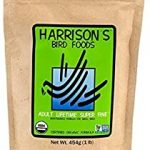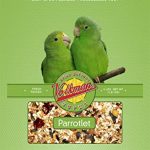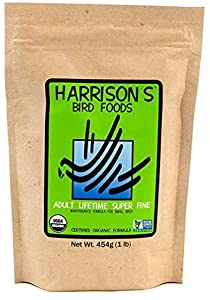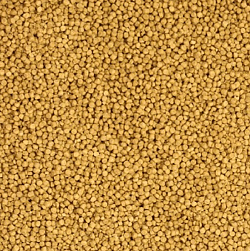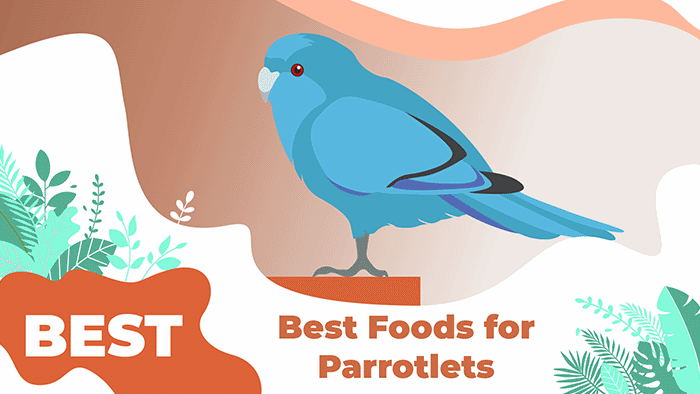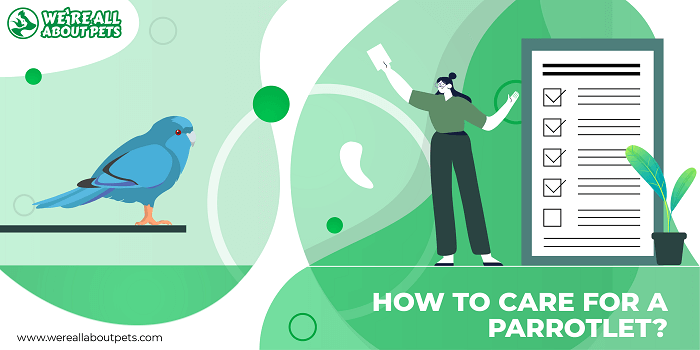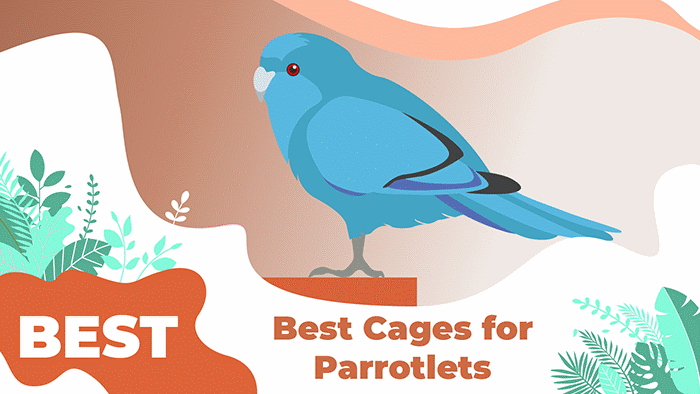What Do Parrotlets Eat?
This page contains affiliate links. We may earn money or products from the companies mentioned in this post through our independently chosen links, which earn us a commission. Learn More
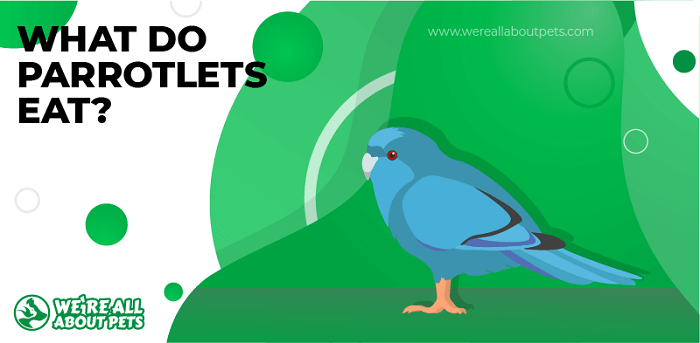
Parrotlets are small birds, but they have a lot of personality. These bold, assertive birds can even learn to talk! If you’re looking for an entertaining pet, parrotlets are certainly one to consider.
If you’re thinking about getting a pet parrotlet, however, it’s important to do your research to make sure it’s the right pet for you. Parrotlets live up to 20 years with proper care, and that includes a healthy diet.
Providing your parrotlet with a balanced diet is essential for its long-term health and wellness. Not only do you need to know what your parrotlet requires in terms of a healthy diet, however – you also need to know what to avoid in terms of toxic foods.
Quick Navigation
Compare Best Commercial Parrotlet Food
|
Protein
14% Min |
Protein
14% Min |
Protein
12.75% Min |
|
Fat
4% Min |
Fat
6% Min |
Fat
10.5% Min |
|
Fiber
5% Max |
Fiber
4.5% Max |
Fiber
9.5% Max |
|
Moisture
10% Max |
Moisture
|
Moisture
15% Max |
Here’s what you need to know about safe and unsafe food for your parrotlet.
Safe And Unsafe Foods For Parrotlets

A healthy diet for any pet is all about balance – this is true for your parrotlet. Your parrotlet requires a blend of protein, healthy fats, carbohydrates, and essential vitamins and minerals in its diet. As a pet owner, it’s your responsibility to meet those needs in a safe and healthy way.
Wondering what your parrotlet can and can’t eat? We’ve assembled a list of dozens of foods that are and aren’t safe for your parrotlet. Check them out below!
26 Foods That Are Safe For Parrotlets:
Parrotlets will gladly accept a wide variety of fruits and vegetables, most of which are safe. Just be sure to double-check the list of toxic foods below or make sure the food is on this list:
- Seeds
- Seed mixes
- Bird pellets
- Apples
- Bananas
- Blackberries
- Cherries (no pit)
- Figs
- Grapefruit
- Kiwi
- Melon
- Pears
- Pineapple
- Plums
- Mango
- Strawberries
- Asparagus
- Carrots
- Cabbage
- Corn
- Cucumber
- Kale
- Parsnips
- Pea pods
- Cuttlefish
- Oyster shells
10 Foods Parrotlets Can Eat In Moderation:
Just because a food is safe for your or parrotlet doesn’t mean it should be included in this everyday diet. Some of these foods can be included in moderation:
- Nuts (unsalted)
- Grapes
- Cooked beans
- Cooked potatoes
- Cooked sweet potatoes
- Whole grains
- Whole-grain cereal (unsweetened)
- Small amounts of cooked fish
- Hard-boiled egg
- Cooked lean meat
9 Foods That Are Not Recommended For Parrotlets:
You may not need to panic if your parrotlet eats the occasional bit of junk food, but it shouldn’t be a replacement for a balanced diet. These foods are not recommended but may not be toxic:
- Human food
- Junk food
- Fried food
- Dairy
- Uncooked beans
- Grit
- Peanuts
- High-fat foods
- High-sugar foods
13 Foods Parrotlets Should Not Eat:
While some foods that aren’t’ recommended for budgies may not do any harm, there are certain foods that are toxic to birds. Avoid these foods entirely:
- Avocado
- Onions
- Aloe vera
- Mushrooms
- Garlic
- Fruit pits
- Fruit seeds (especially apple)
- Coffee and coffee beans
- Alcohol
- Caffeine
- Rhubarb
- Chocolate
- Sugar-free candy
Understanding which foods are and are not safe for your parrotlet is very important, but a healthy start starts with understanding your parrotlet’s nutritional requirements. Read on to learn the specifics of what to feed your parrotlet in different life stages.
Types Of Parrotlet Diets
When choosing a diet for your parrotlet, the biggest decision you have to make is whether to offer a seed-based diet or a pellet diet.
Commercial pellets are a convenient option and they provide balanced nutrition. Seeds are closer to your bird’s natural diet, but it can be difficult to achieve the right nutritional balance. No matter which you choose, you’ll still need to supplement the diet with fresh foods.
Here is a quick breakdown of the different components of a pet parrotlet’s diet:
- Seeds – If you’re feeding your parrotlet a seed-based diet, seeds should still only make up 60% of the diet. You should still include some pellets and supplement the diet with fruits, vegetables, and other sources of protein. If feeding seeds, make sure there’s a variety of at least 5 kinds.
- Pellets – Commercial bird pellets are nutritionally balanced which makes them a convenient option. Many birds don’t take to pellets immediately, however, so you may need to transition your parrotlet onto them or start feeding them at a very young age.
- Fruits and Vegetables – Fresh fruits and vegetables should be offered daily in small amounts, up to about 20% to 25% of your parrotlet’s diet. Be sure to offer a variety throughout the week and refer to the lists above for safe and unsafe options.
- Treats – Offer treats a few times a week – they shouldn’t be part of the daily diet. Your parrotlet may enjoy small amounts of hardboiled egg, shelled nuts, or high-fat seeds like sunflower.
Now that you know what kinds of foods will make up your pet parrotlet’s daily diet, you’re probably wondering how much to feed. Keep reading to learn about feeding recommendations for these birds.
Meeting Your Pet Parrotlet’s Nutritional Needs
In the wild, parrotlets follow a varied diet of seeds, fruits, berries, and vegetables with some insects, flowers, and other vegetation. In the home, your parrotlet won’t follow the same exact diet, but you should try to approximate the variety and nutritional balance.
Many bird owners find a commercial pellet is the best option because these foods are uniquely formulated for the nutritional needs of parrotlets. You’ll still need to supplement your pet’s pellet diet with fresh foods, but the pellet should cover all the major bases.
In addition to providing your parrotlet with a nutritionally balanced pellet or seed-based diet, you may want to consider supplementing with a source of calcium. Popular options include cuttlebone or oyster shells – many birds enjoy cuttlebones as a source of entertainment.
Calcium becomes particularly important once your parrotlets start to lay eggs.
To give you an idea what parrotlets eat and how much you should be feeding your pet bird in different stages of life, refer to this chart:
Daily Parrotlet Feeding Chart |
||||
| Age | Seeds | Pellets | Fruits/Veggies | Treats |
| 2 to 3 months (weaned) | Millet and other fine seeds | Transition to mixed diet with parrotlet seed mix and pellets | Small amounts daily, well chopped | None |
| 3 to 5 months | Reduce proportion of seeds to pellets | Feed mixed diet of pellets and parrotlet seeds, increasing the ratio of pellets to seeds over time | Small amounts daily, well chopped | Small amounts of millet |
| Adult | 1 to 3 tbsp. seeds
OR 1 to 3 tbsp. pellets |
1 to 3 tbsp. seeds
OR 1 to 3 tbsp. pellets |
20% to 25% of the daily diet from chopped mixed fruits and veggies | Occasional, small amounts |
In addition to providing a healthy and balanced diet for your parrotlet, be sure to provide access to fresh water at all times as well. Birds tend to get their water dishes messy with dropped seed, so be prepared to clean and refill the dish at least once a day.
Recommended Commercial Parrotlet Foods
Nutritional balance is essential for any pet, but it can be tough to provide your parrotlet with the right balance of nutrients on your own. Commercial bird diets make it a little bit easier because they are formulated to provide specifically for your parrotlet’s nutritional needs.
When choosing a commercial diet, it is important to consider the quality of the ingredients. A poor-quality commercial diet may not be any better than an imbalanced homemade diet.
Whether you choose to feed your parrotlet a commercial bird pellet or a seed-based diet, remember to supplement it with fresh foods. Fresh fruits and vegetables should make up about 20% to 25% of your pet bird’s diet and treats should only be offered a few times a week.
Here are some of our top picks for the best commercial parrotlet food:
ZuPreem Natural Daily Medium Bird Food
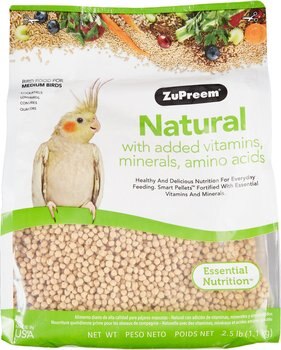
Product Info
- Protein: 14% Min
- Fat: 4% Min
- Fiber: 5% Max
- Moisture: 10% Max
Guaranteed Analysis

Dry Matter Basis

Harrison’s Adult Lifetime Super Fine
Product Info
- Protein: 14% Min
- Fat: 6% Min
- Fiber: 4.5% Max
Guaranteed Analysis

Dry Matter Basis

Volkman Avian Science Diet Parrotlet Bird Food
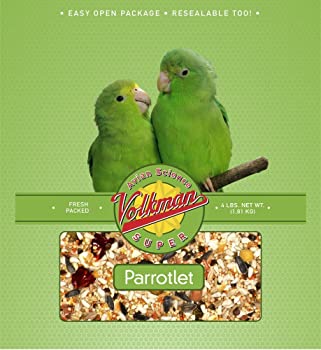
Product Info
- Protein: 12.75% Min
- Fat: 10.5% Min
- Fiber: 9.5% Max
- Moisture: 15% Max
Looking for more recommendations on what to feed your pet parrotlet? Check out our in-depth guide to the best commercial parrotlet foods.
Parrotlet Feeding FAQs
What do parrotlets eat in the wild?
The parrotlet is a small parrot native to the Amazon region. These birds are known for their voracious appetites and will eat a variety of foods including seeds, fruits, berries, blossoms, and other vegetation. Parrotlets may eat insects on occasion, but they are not part of the staple diet.
How much do parrotlets eat?
Though they may be small, parrotlets sometimes have a big appetite. You’ll need to feed your bird between 1 and 3 tablespoons per day pellets or seeds, supplementing the diet with fresh foods like fruit, vegetables, and edible blossoms.
What do parrotlets drink?
Parrotlets drink water and they should have fresh water available at all times. Make sure to clean and refill your parrotlet’s water dish at least once a day.
Do parrotlets eat insects?
Technically speaking, parrotlets are omnivores because they are able to digest animal foods. That being said, insects are the only non-vegetation parrotlets are likely to eat in the wild and they generally don’t make up a significant part of the natural diet.






